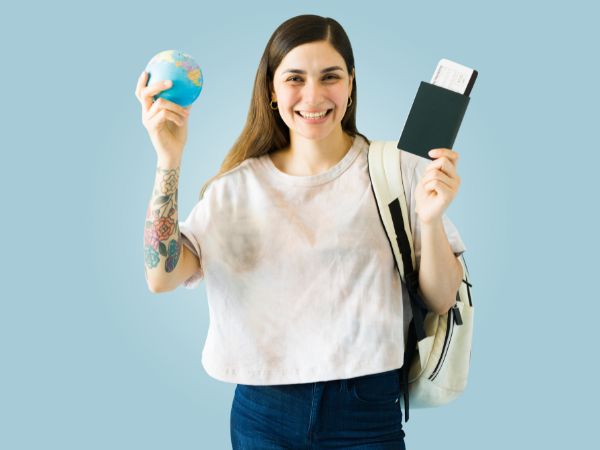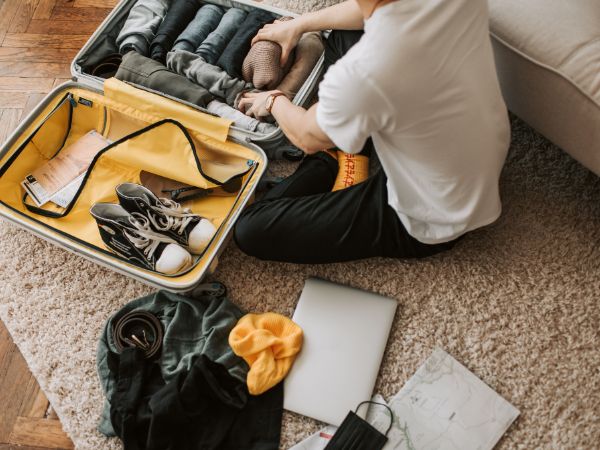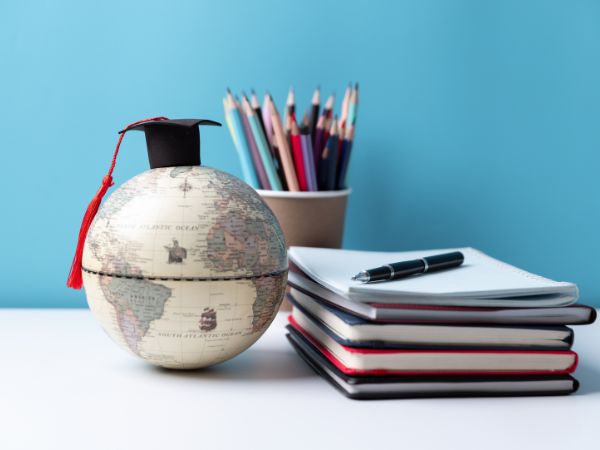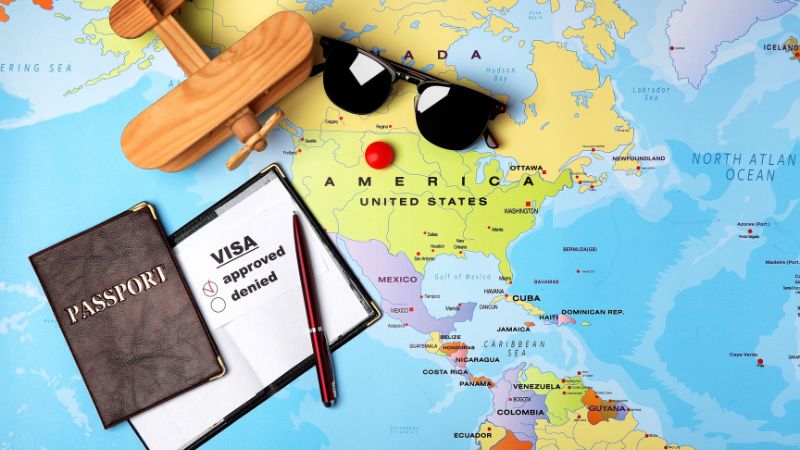Ready to fly towards new horizons? Discover how you can prepare to study abroad and feel confident that you are fully organised – from practical matters to cultural norms.
You’ve booked your study abroad experience, and it suddenly all feels very real. It sounds wonderful and exciting, of course – but we also know that in these situations, the excitement of living and learning in a foreign country can be tinged with a hint of uncertainty about how to take those first steps. But don’t worry, you’re not alone! There are thousands of international students planning to study abroad.

Right now, your mind is likely a whirlwind of thoughts, and the list of things to sort before leaving the country feels never-ending. So, what are the essential steps to take before departure, whether you’re spending a year abroad or a week? When – and how – should you start getting everything in order at home so you can fully embrace this new adventure abroad?
What to Do Before Leaving Your Home Country
In this article, we’ve compiled a study abroad checklist, preparing you before you even depart. We’ve followed a roughly chronological order, but keep in mind that your checklist may vary depending on your host college or family. Here’s how to prepare yourself so this journey becomes a true springboard for your personal growth.
Contents
Research Your Destination
It’s important to be aware that different countries require different things, and each has their own unique immigration legislation.
Do you need a student visa or not?
Certain countries need an ETA Visa and some don’t, for example. So it’s better to research the entry requirements several months in advance when you prepare to study abroad so you can avoid any nasty surprises at the airport in a new country.
Find Out Which Important Documents You Need and Keep Them Organised
When studying abroad, one of the most crucial aspects is having all your important documents organised and easily accessible. Make sure you have your passport and visa (if required), college documents, and emergency contact information – both in digital and paper form. It’s also wise to leave a copy with your family, just in case.

You can store digital copies in your email or a cloud service. Platforms like Google Drive, Dropbox, or Microsoft OneDrive provide secure and accessible storage so you can reach your important documents from any internet-connected device, giving you easy access wherever you are.
Keep your physical copies in your hand baggage, don’t make the mistake of sending them away in your checked baggage!
Confirm Your Travel Details
Before setting off, double-check that all your travel arrangements are confirmed and well organised. Going over your flight details, schedules, and meeting points for airport transfers can save you from unnecessary last-minute stress.
Apps like TripIt are great for keeping your travel plans in one place. They monitor your flights and transfers, and send real-time alerts about changes or updates. Many also let you share your itinerary with friends or family so they can keep track of your journey and be reassured of your safe arrival.

Other options include Google Trips and Kayak, available in many countries, which offer similar features and help streamline your travel planning.
Local Currency
It’s often overlooked, but exchanging a reasonable amount of cash into the new countries currency before you go is vital. Having some physical money on hand makes things just that bit easier, and can be especially useful in countries where credit cards aren’t widely accepted, or in more rural areas where ATMs are scarce.

Plus, expect that airport ATMs might charge high fees or even be out of service, potentially putting you in a tight spot upon arrival.
To change your currency, visit your bank or a currency exchange bureau before you leave. If you’d rather avoid carrying too much cash, consider a prepaid travel card or an international debit card – safer and often offering better exchange rates.
Stay Connected
Before you depart, check your mobile provider’s international roaming options. Some offer affordable plans for foreign students that allow you to use your existing number abroad without racking up massive bills. It’s not only helpful for getting around your new country, but it can help you stay in touch with your loved ones back home. They might worry about you if they can’t contact you abroad, and speaking with your family can help alleviate any homesickness you might feel.
However, it may be more practical and cost-effective to purchase a local SIM card once you arrive. These often come with generous data packages, perfect for using maps, social media, or calling apps like WhatsApp or Skype without worrying about data caps.

It’s also a good idea to pre-download communication apps that perform well even on slower or unstable connections, and to save offline versions of local maps – useful in areas with limited service or to conserve your mobile data.
If you are staying with a host family while living abroad, you can ask them for recommendations to help you gain a better understanding. If you don’t have a host family, don’t worry! You can ask other students, and at many universities or colleges you can find support services who will help you if you are stuck.
Make a Study Abroad Packing List
Travelling light but efficiently makes everything easier. First things first – don’t forget a universal travel adapter. It works with various plug types and will keep your electronics charged. A sturdy power bank is another must-have, especially during long journeys or in places where charging points are scarce.

Be mindful with clothing choices. Pack based on the local climate, opting for versatile items that allow you to adapt to unexpected weather changes. For colder climates, bring layered outfits. For warmer destinations, go with breathable and lightweight clothes. A foldable umbrella and a waterproof jacket are always handy too.
Packing organisers and compression bags help keep everything tidy and maximise suitcase space. They’re also ideal for separating clean and dirty clothes, managing small electronics, or grouping similar items together.
Health and Safety when you Study Abroad
Don’t forget destination-specific items like insect repellent or high-SPF sun cream if you’re heading somewhere hot on your study abroad holiday.
If you’re on any regular medication, pack enough for your entire stay and carry prescriptions to avoid issues at customs. Speak to your doctor if you’re worried, and packing doctor’s notes may also help if you need to replenish your supply locally.

Check whether your health insurance covers international travel or study abroad holidays, or consider purchasing separate travel insurance that includes medical cover. This gives peace of mind, covering doctor visits, emergency care, and even medical repatriation if necessary.
Time to Socialise!
Socialising is a major part of your study abroad experience. Speaking with fellow international students on your programme gives you a support network and lets you share tips, expectations, or even plan activities together once you arrive.

Most programmes and host institutions have official pages or social media groups for students to meet, ask questions, and exchange information. Joining these is a great way to gain insight into what to expect and prepare for the experience ahead.
You can also explore apps or platforms that link people with similar interests – a brilliant way to immerse yourself in the local culture and casually boost your language skills.
Set Your Expectations and Make Goals
Now’s the time to set some personal goals to make the most of your time abroad. Having clear intentions gives you focus and helps you stay motivated during your stay.
If improving your language skills is high on your list, set concrete milestones like achieving a certain test level or holding a fluent conversation with a native speaker.

Meeting new people and making new friends with international students from around the world can be a goal in itself. Discovering the local culture will enrich your experience and deepen your understanding of your host country.
These goals will help you keep sight of why you chose to study abroad and how this journey supports your personal and professional development, which will help you cope with feelings of homesickness and culture shock.
Ready for Take-Off?
Don’t forget – studying abroad is also a holiday! Pack a good book, download your favourite music, and prepare to fully embrace the local culture. Studying abroad can be stressful in the planning stage, but once you’ve set off from your home country, all of the organisation will have been so worth it.

Keeping an open and flexible mindset will allow you to appreciate even the unexpected parts of your study holiday – and those often turn into the most memorable adventures and best stories to tell.
This journey is far more than just an academic experience. It’s a gateway for international students to discover new cultures, friendships, and life-changing opportunities. And remember: preparation is key to a smooth start and an unforgettable stay.




